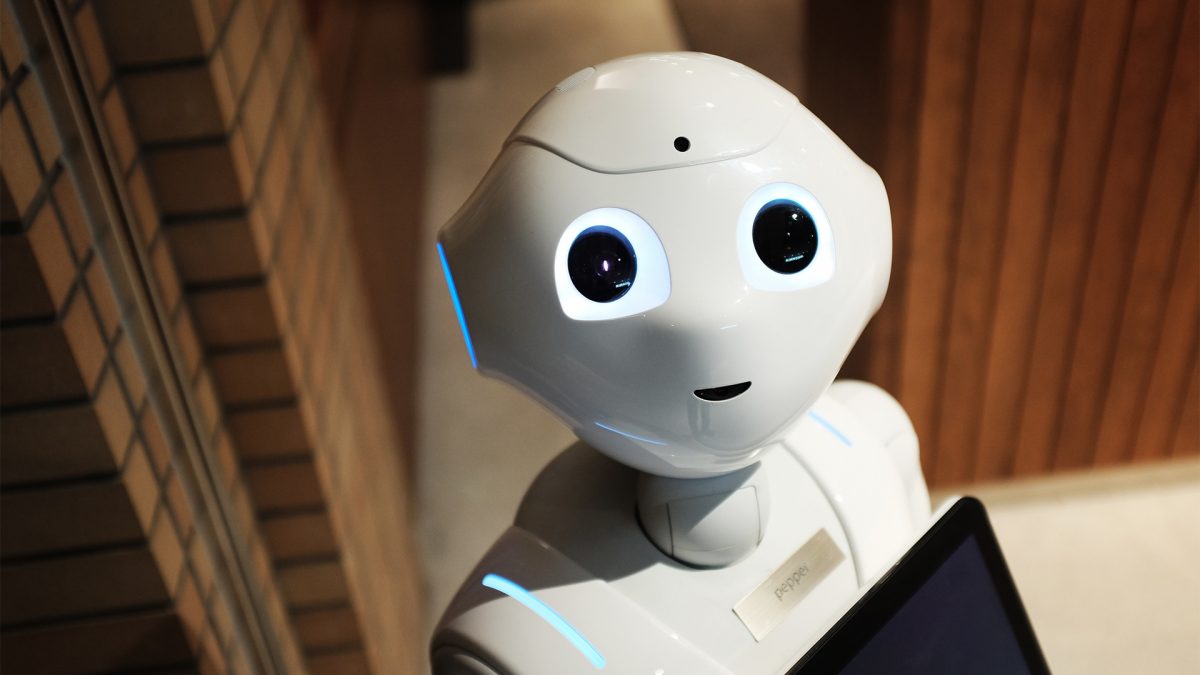
15 idioms commonly used in Australia
4 de junho de 2018Artificial Intelligence
I was recently talking to a friend who’s an accountant. He has his own accounting firm and lives an upper-class lifestyle in the Chicago suburbs. He said he will happily pay for his daughter’s college education, provided she won’t pursue a degree in accounting.
This isn’t the first time I’ve heard a parent say they don’t want their child following in their career footsteps; a lawyer recently told me the same thing. And it’s not because they feel they’ve been unsuccessful or that their career was too demanding. It’s because they feel future job prospects in their fields are bleak due to one thing: automation.
Automation, which includes both mechanised robots (whether humanoid or drone-shaped) and artificially intelligent software programs, are predicted to eliminate 6% of the jobs in the U.S. in the next five years. And it’s not just low-wage employees that need to be worried. Highly skilled, knowledge-based employees in some sectors, including legal and accounting, could see their jobs decimated in the next decade. Deloitte estimates that 39% of jobs in the legal sector could be automated in the next 10 years. Separate research has concluded that accountants have a 95% chance of losing their jobs to automation in the future.
But it’s not just professionals in the legal and accounting sectors that will see jobs disappear due to automation. Knowledge workers, retail, and manual laborers will also see their job prospects decline. Here are the jobs that could be hit the worst.
- INSURANCE UNDERWRITERS AND CLAIMS REPRESENTATIVES
The effects of automation on the insurance industry are already being felt. In Japan, a big insurance company has recently replaced 30 of its medical insurance claims reps with an AI system based on IBM’s Watson Explore. The software can “analyze and interpret all of your data”.
- BANK TELLERS AND REPRESENTATIVES
First it was the ATM that ate into human banking jobs, then the smartphone app. It’s likely that many of the remaining human-based teller and representative banking jobs will be finished off by AI. AI won’t just be able to conduct cash transactions; it will be able to open accounts and process loans at a fraction of the cost and time it takes for human employees.
- FINANCIAL ANALYSTS
Human financial analysts can no longer compete with artificially intelligent financial analysis software that can read and recognize trends in historic data to predict future market moves. It’s no wonder that financial analyst jobs could be the worst hit in the estimated 30% of banking sector jobs lost to AI in the next five to 10 years.
- CONSTRUCTION WORKERS
Manual labor jobs are also under threat by automation. Robotic bricklayers will soon be introduced to construction sites that enable the machines to replace two to three human workers each. SAM (Semi-Automated Mason) can lay up to 1,200 bricks a day, compared to the 300 to 500 a human can do. The use of SAM reduces the need for the three bricklayers it would take to do the same job.
- INVENTORY MANAGERS AND STOCKISTS
The supermarket employee restocking the cans may soon no longer be a person. As robots become more advanced, they are capable of performing actions that previously required a person, such as managing inventory on a store shelf. While robots can cost retailers tens of thousands up front, chain stores stand to save hundreds of thousands to millions of dollars over the long run because, unlike humans, robots don’t get sick, need holidays, require a payment, and can be retrained in an instant with a simple software update.
- FARMERS
Farmers are being replaced by artificially intelligent robots that can do everything from milk cows to pull lettuce. A family-owned dairy farm in Germany is one of the first to install Voluntary Milking System robots that allow cows to walk up to the machines at their leisure when they want to be milked.
- TAXI DRIVERS
While traditional taxi drivers may be feeling the threat from Uber and Lyft, drivers of all three will see their jobs dry up as autonomous vehicles hit the road. And it’s the ride-share companies who can’t wait to rush their drivers out of the car. As Uber’s CEO has said, its service would be a lot more inexpensive and its profits much greater if you weren’t “paying for that other friend in the car.” In the next 10 years, cities across the world will have several self-driving taxis. Uber is testing such vehicles and Singapore is the first country to already put up to a dozen on the roads.
- MANUFACTURING WORKERS
What you hear from populist politicians the world over is that they will bring manufacturing jobs back to the U.S. But that’s never going to happen. Even China, the country where the majority of the world’s manufacturing jobs exist, will see its human manufacturing workforce taken by robots in the near future. As a matter of fact, it’s already happening. Foxconn, the manufacturer who makes everything from iPhones to Xboxes, recently replaced 60,000 workers with robots.
- JOURNALISTS
It turns out writing is not a problem for AI. In 2014, the Associated Press began to use intelligent software to write quarterly earnings reports. Up to 3,000 reports are being written by AI every quarter. It’s possible that content sites of the future could exist without any human writers at all.
- MOVIE STARS
It’s possible that we could see actors looking as young in movies as they did when they first started on the big screen. Recently, Hollywood has taken a liking to advanced CGI techniques that allow even deceased actors to be resurrected from the dead–the most notable example being Peter Cushing’s Grand Moff Tarkin CGI resurrection in Rogue One: a Star Wars Story. In the same 2016 movie, Carrie Fisher also appeared as the 21-year-old Princess Leia from the 1977 Star Wars film. It’s possible that if both studios and audiences embrace the CGI resurrection technology, there will be fewer jobs for new potential movie stars in the future as the same beloved stars of today (and yesterday) could keep staring and “acting” in big blockbusters for decades to come.
SO WHAT DOES THIS MEAN FOR THE FUTURE OF WORK?
Is the world going to become a place in which automation is everywhere yet employment is scarce? It all depends on the kinds of policies governments take to manage this problem. Presently, automation is proceeding at a relatively slow pace because labor markets are loose and supply is plentiful. However, if the incoming U.S. president and the current U.K. government decide to restrict immigration, the market becomes tighter. Similarly, the baby boomer generation are retiring and withdrawing from the workplace, and the generational cohorts following them are less numerous. With tighter labor markets, wage pressures are likely to build, and the solution to protect profits is to invest in more automation. Therefore the worst case is sharpening unemployment.
But there is hope. People who choose careers, such as in the creative, technology, or health care industries, in which the building of or decision making about relationships are central, will thrive during the next wave of automation. And then there are the policies governments could adopt to avoid or at least mitigate the problems automation will bring.
One would be the introduction of a basic income payable to all citizens that would give people independence from work as a means of making a living–and give them more freedom to take risks, such as starting a new business. Or alternatively, the benefits of automation could be shared by reducing the workweek. If automation means higher productivity, do we need people working 40-hour weeks alongside masses of people who can’t find work?”
DISCUSSION
1-“He will happily pay for his daughter’s college education, provided she won’t pursue a degree in accounting”.
- Do you think you should choose your university course according to your preference or to the job market?
- Are there professions that are more financially rewarding than others?
- If you wanted to choose a payless profession, would your parents support you?
“Parents say they don’t want their child following in their career footsteps; because they feel future job prospects in their fields are bleak due to one thing: automation.
- What do you think about following your parents’ career?
- If your parents had a prosperous business and expected you to take over when they retire, would you do it? On what conditions?
Questions:
1-What is artificial intelligence?
3-Will artificial intelligence ever be more intelligent than humans?
4-What are the good and bad things about artificial intelligence?
5-What are the differences between artificial intelligence and human intelligence?
6-What will the professionals replaced by AI do for a living?
7-What will artificial intelligence be like in 100 years from now?
Are you For (F) or AGAINST (A) the arguments below? Explain why:
( ) With artificial intelligence, the chances of error are almost inexistent and greater precision and accuracy is achieved.
( ) Artificial intelligence finds applications in space exploration. Intelligent robots can be used to explore space. They are machines and hence have the ability to endure the hostile environment of the interplanetary space.
( ) Apart from all these cons of AI, there is a fear of robots superseding humans. Ideally, human beings should continue to be the masters of machines. However, if things turn the other way round, the world will turn into chaos. Intelligent machines may prove to be smarter than us, they might enslave us and start ruling the world.
( ) If robots begin to replace humans in every field, it will eventually lead to unemployment. People will be left with nothing to do. So much empty time may result in its destructive use. Thinking machines will govern all the fields and populate the positions that humans occupy, leaving thousands of people jobless.
( ) Intelligent machines can replace human beings in many areas of work. Robots can do certain laborious tasks and perform painstaking activities.
( ) Smartphones are a great example of the application of artificial intelligence.
Applications on phones or computers that predict user actions and also make recommendations that suit user choice, are applications of AI. Thus, we see that artificial intelligence has made daily life a lot easier.
( ) If the control of machines goes in the wrong hands, it may cause destruction. Machines won’t think before acting. Thus, they may be programmed to do the wrong things, or for mass destruction.
( ) Fraud detection in smart card-based systems is possible with the use of AI. It is also employed by financial institutions and banks to organize and manage records.
( ) Organizations use avatars that are digital assistants who interact with the users, thus saving the need of human resources.
( ) Machines may be able to store enormous amounts of data, but the storage, access, is not as effective as in case of the human brain. They may be able to perform repetitive tasks for long, but they do not get better with experience, like humans do.
( ) Lacking the emotional side, robots can think logically and take the right decisions. Sentiments are associated with moods that affect human efficiency. This is not the case with machines with artificial intelligence.
( ) Imagine intelligent machines employed in creative fields. Do you think robots can excel or even compete the human mind in creative thinking or originality? Thinking machines lack a creative mind. Human beings are emotional intellectuals. They think and feel. Their feelings guide their thoughts. This is not the case with machines. The intuitive abilities that humans possess, the way humans can judge based on previous knowledge, the inherent abilities that they have, cannot be replicated by machines. Also, machines lack common sense.
( ) The idea of machines replacing human beings sounds wonderful. It appears to save us from all the pain. But is it really so exciting? Ideas like working wholeheartedly, with a sense of belonging, and with dedication have no existence in the world of artificial intelligence. Imagine robots working in hospitals. Do you picture them showing the care and concern that humans would? Due you think online assistants (avatars) can give the kind of service that a human being would? Concepts such as care, understanding, and togetherness cannot be understood by machines, which is why, how much ever intelligent they become, they will always lack the human touch.
( ) When we play a computer game or operate a computer-controlled bot, we are in fact interacting with artificial intelligence. In a game where the computer plays as our opponent, it is with the help of AI that the machine plans the game moves in response to ours. Thus, gaming is among the most common examples of the advantages of artificial intelligence.
( ) AI is at work in the medical field too. Algorithms can help the doctors assess patients and their health risks. It can help them know the side effects that various medicines can have. Surgery simulators use machine intelligence in training medical professionals. AI can be used to simulate brain functioning, and thus prove useful in the diagnosis and treatment of neurological problems. As in case of any other field, repetitive or time-consuming tasks can be managed through the application of artificial intelligence.
( ) Machines do not require sleep or breaks, and are able to function without stopping. They can continuously perform the same task without getting bored or tired. When employed to carry out dangerous tasks, the risk to human health and safety is reduced.
( ) One of the main disadvantages of artificial intelligence is the cost incurred in the maintenance and repair. In case of a breakdown, the cost of repair may be very high. Procedures to restore lost code or data may be time-consuming and costly.
( ) Artificial intelligence can be utilized in carrying out repetitive and time-consuming tasks efficiently.( )Intelligent machines can be employed to do certain dangerous tasks as well.
( ) Robotic pets can help patients with depression and also keep them active.
( ) An important concern regarding the application of artificial intelligence is about ethics and moral values. Is it ethically correct to create replicas of human beings? Do our moral values allow us to recreate intelligence? Intelligence is a gift of nature. It may not be right to install it into a machine to make it work for our benefit.
( ) Machines may be able to store enormous amounts of data, but the storage, access, is not as effective as in case of the human brain. They may be able to perform repetitive tasks for long, but they do not get better with experience, like humans do.
( ) Also, due to the reduced need to use their intelligence, lateral thinking and multitasking abilities of humans may diminish. With so much assistance from machines, if humans do not need to use their thinking abilities, these abilities will gradually decline. With the heavy application of artificial intelligence, humans may become overly dependent on machines, losing their mental capacities.
( ) Artificial intelligence can be utilized in carrying out repetitive and time-consuming tasks efficiently.
Write an essay expressing your opinion about Artificial Intelligence. (Use 250 words)






2 Comments
Adorei o texto!!!
Ótimo texto! Torcendo para que a minha profissão não seja tomada por Inteligência Artificial!